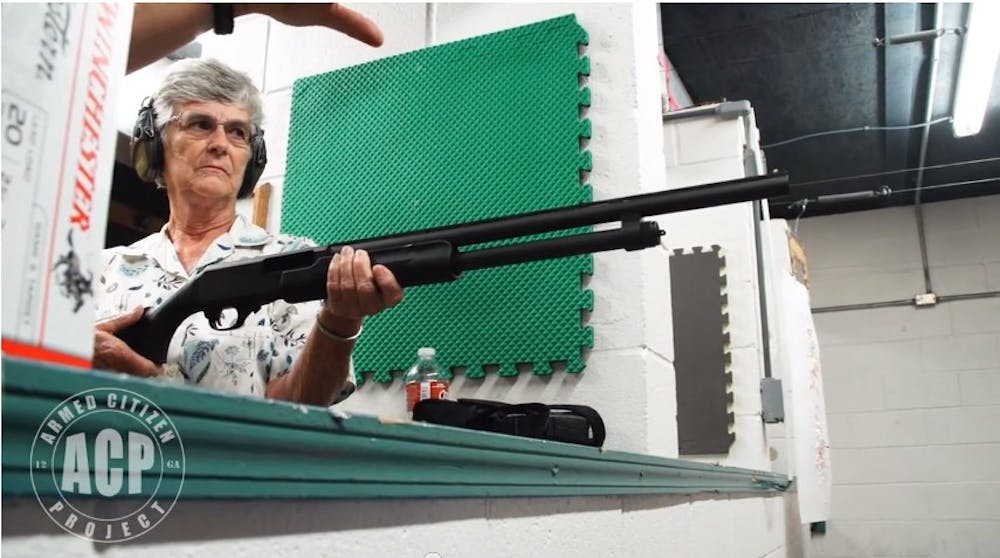Would arming citizens and posting signs deter crime?
Chauncey Baker – a sophomore, telecommunications major
“I agree, it would deter some crime by intimidation.”
Dakodah Carlin, a freshman:
“I think it would deter crime because it would make criminals more hesitant.”
Dylan Vinson, a freshman Spanish education major:
“It’s not exactly the best way to go about things. His intentions are good, but I am not sure giving out guns, even with the training and background checks, will have the effect he wants.”
• Ball State alumnus runs program putting guns into high-crime neighborhoods.
• Project has trained 240 and armed 90 citizens.
• Armed Citizen Project to begin in Indiana in February.
A Ball State alumnus plans to bring free guns and a safety program to Indianapolis in February, in an attempt to prove an armed and trained community reduces crime.
The Armed Citizen Project chooses neighborhoods in cities with average to high crime rates and then offers a free pump-action shotgun to any willing citizen in the neighborhood who also passes a background check and takes part in a gun safety program.
“We’re giving shotguns because they’re perfect for house safety,” Kyle Coplen, the founder, said. “They’re also much cheaper than handguns, and the pump-action sound is a perfect deterrent. It sends chills up people’s spins.”
Training includes education about gun safety and practice at a gun range so participants are comfortable holding their weapons.
So far, the project has trained 240 citizens and armed 90, Coplen said.
“We’re not just throwing shotguns into random yards,” he said.
Coplen grew up in Rochester, Ind., and graduated from Ball State in 2008. He then moved to Houston for graduate school.
Coplen said he started the Armed Citizen Project after witnessing the physical and emotional aftermath for a veteran whose house in Houston was burglarized.
“It was then I decided I would help him and others in the neighborhood feel safer,” he said.
The Armed Citizen Project primarily targets single mothers, people who live alone and others who may experience difficulty defending themselves.
The project is offering guns to as many as 400 residences in a community near Houston that had a total of 107 home invasions in 2012, Copelan said.
In Indianapolis, the organization will focus on three neighborhoods, seeking to train 40 to 50 citizens in each neighborhood with classes starting in February.
“People need safety for their mental health,” Coplen said.
To further deter criminals, the group offers participants signs to place in front of homes to advertise that the homeowners possess guns.
Jordan Meyer, a senior sociology major, said he disagreed with the program in the beginning.
“At first, I thought it was terrifying,” Meyer said.
But after he read that the program requires background checks, he changed his mind.
“If they’re going through the proper channels, it’s fine,” he said.
Dylan Vinson, a freshman Spanish education major, said he disagrees with the program.
“It’s not exactly the best way to go about things,” he said. “His intentions are good, but I am not sure giving out guns, even with the training and background checks, will have the effect he wants.”
Coplen, though, said people who oppose the program probably don’t understand what the Armed Citizen Project does.
Despite Coplen’s firm belief, he said adding guns to neighborhoods isn’t the end-all solution to crime.
“Armed Citizen Project is not the full solution,” Coplen said. “Crime is an accumulation of things. Armed Citizen Project is just one of the solutions.”
Brady Hertel, a freshman social studies education and history major, said he thinks the program could work so long as people are aware of it.
“If I was a robber and I knew they had a gun, I’d be hesitant to break in,” Hertel said. “As long as they stay true to the background checks and don’t give guns to criminals, I can see it preventing some crime.”
In the future, Coplen would like to bring the Armed Citizen Project to universities through student outreach, including Ball State.
“I loved my time at Ball State,” Coplen said. “Starting maybe a student group there would be great.”
Coplen said after the program’s third year, he will gather information about crime in the participating neighborhoods and publish the results.





